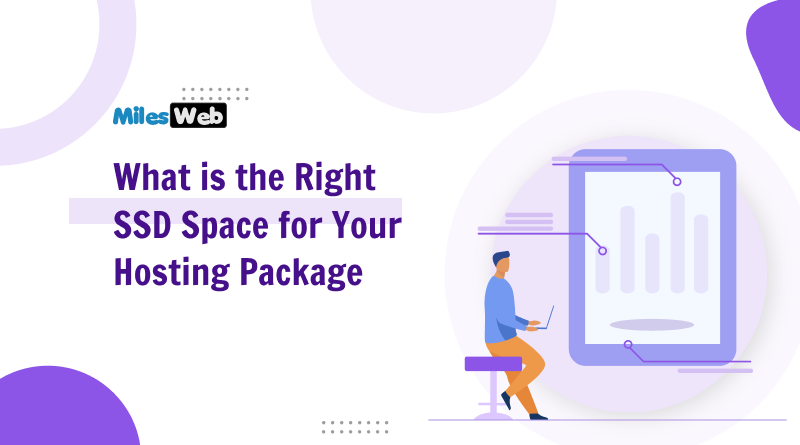
When your website is online, one of the top things on your checklist is having superfast website loading speed. And what if I say that a major part of a website’s speed depends on the shared hosting UAE with cPanel you choose? SSDs, or Solid State Drives are more than just a tech buzzword; they’re the components that impact your website’s overall performance.
In this article, we’ll cover the basics of SSD web hosting and their importance, particularly in the context of Linux shared hosting.By the end of this read, you’ll know how to determine the ideal SSD space for your hosting needs; that’s what we’re aiming for.
So let’s begin without any delay.
What Does SSD Storage Mean In Terms Of Web Hosting?
SSDs (Solid State Drives) are a type of storage technology. In web hosting, SSDs pave the vital path by using flash-based storage devices to store files and databases. SSD is a device that has integrated circuit assemblies, these assemblies are responsible to collect and store the data. Since SSDs lack physical spinning disks and floppy disks, it is very unlikely to have any damage due to shocks.
Thus, they become the durable option to provide the maximum rate of inputs and outputs of data and run smoothly. Compared to HDDs, SSDs require very minimal maintenance.
SSDs are primarily used in highly operational applications where the storage system needs the highest speed available. With SSDs, the high-speed requirements are met easily.
How Is An SSD Different From A Hard Disk Drive?
Unlike traditional Hard Disk Drives (HDDs) that use spinning disks, SSDs utilize semiconductor technology. This fundamental difference in both technologies is between data access speeds, reduced latency, and improved overall system performance.
Importance Of SSD Storage
The importance of SSDs in web hosting cannot be overstated. In a competitive online environment where every second matters, the speed at which your website loads can make or break the user experience. SSDs are renowned for their blazing-fast data retrieval process and reduced latency. This means your website loads swiftly, keeping visitors engaged and satisfied.
Advantages Of SSDs
While speed is the top advantage factor, there are several other benefits to SSD storage. They are as follows:
- High-class reliability features
- Durability with fewer mechanical failures
- Highly energy efficient
- Rugged and strong computing environments
Drawbacks Of SSDs
Since every coin has two sides, along with the advantages of SSD storage, there are also disadvantages. So before making your decision, it’s essential to consider the drawbacks.
- High cost
- A finite number of write cycles
- Limited lifespan as it wears out with extensive use
- Lower storage capacity than HDDs
Effects Of SSDs On Your Website, And Why Is SSD Important For Web Hosting?
The use of SSDs in your hosting package can have a profound impact on your website’s performance. When visitors access your site, the data they request is retrieved from the server. With SSDs, this process is lightning-fast, resulting in quicker page load times, smoother navigation, and an overall better user experience.
Additionally, search engines like Google consider website speed as a ranking factor. A faster website can potentially lead to better search engine rankings, attracting more organic traffic to your site. In simple words, we can conclude that SSDs are one of the ranking factors to consider.
Types Of SSDs
There are different types of SSDs, each with its own unique characteristics:
SATA SSDs:
These are the most common type of SSD and are compatible with most systems. They offer a significant speed boost compared to HDDs.
NVMe SSDs:
Non-Volatile Memory Express (NVMe) SSDs are even faster than SATA SSDs. They connect directly to the motherboard, reducing intermissions and increasing data transfer speeds.
Enterprise SSDs:
Designed for data centers and enterprise environments, these SSDs offer higher reliability and endurance compared to the other two types.
Expenses For SSDs
While SSDs are more expensive than HDDs, their cost has been steadily decreasing. You’ll find many hosting providers offering SSD-based hosting packages at affordable prices. So, before you make your decision, it’s a smart move to do some thorough research.
Compare the offers from different providers to make sure you’re getting the best value for your money
The Ideal SSD Space For Your Websites
Now, let’s tackle the ultimate question: “How much SSD storage do I need for a website?”
Well, there’s no one-size-fits-all answer to that.To figure out the perfect amount of SSD space for your website, you’ve got to dig into your website’s specific needs. Here are some key points to consider when making your decision.
Website Type
The kind of website you’re running makes a big difference. For example, e-commerce sites with lots of products might need more storage compared to a personal blog.
Content
Think about the type and size of your content. Websites heavy on videos and images will demand more storage than text-based ones.
Traffic
Websites that draw in a lot of visitors tend to generate more data, so they’ll need extra storage space.
Growth
Plan for the future. It’s smart to choose a hosting package that leaves room for expansion as your website and audience grow. This proactive approach ensures you’re prepared for growth without any last-minute plan upgrades to worry about.
Budget
Finding the right balance between your storage needs and your budget is crucial. While SSDs bring speed and reliability, you’ll want to select a plan that fits within your financial constraints.
Let’s Conclude
SSD is a game-changer in the world of web hosting.
They offer speed, reliability, and improved user experiences, all of which contribute to the success of your website. While SSD costs a bit more than HDD, SSD hosting is quite an affordable option, as the benefits in terms of website performance and customer satisfaction make it a worthy investment.
I trust that this article has addressed your questions about “What is an SSD?” or “What are the types of SSD?” When determining the ideal SSD space for your hosting package, consider your website type, content, traffic, growth projections, and budget.
With the right SSD configuration, your website can thrive in the competitive online landscape.








